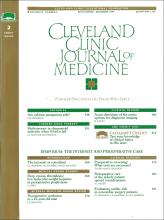Index by author
Kottke-marchant, Kandice
- You have accessThe preoperative bleeding time test: assessing its clinical usefulnessAmy S. Gewirtz, MD, Kandice Kottke-Marchant, MD, PhD and Michael L. Miller, DOCleveland Clinic Journal of Medicine November 1995, 62 (6) 379-382;
Because of the bleeding time test's low value in predicting perioperative bleeding, it should be abandoned as a routine screening test.
Longworth, David L.
- You have accessPostoperative confusion in a 42-year-old manDavid L. Longworth, MD, James K. Stoller, MD and J. Harry Isaacson, MDCleveland Clinic Journal of Medicine November 1995, 62 (6) 370-371;
Recognizing the cause of postoperative confusion and treating the problem: a self-test
- You have accessA 55-year-old man with chronic liver disease and coagulation abnormalitiesCharles Anderson, MDCleveland Clinic Journal of Medicine November 1995, 62 (6) 372-373;
Assessing the effect of cirrhosis on coagulation and preventing perioperative bleeding: a self-test
Marwick, Thomas H.
- You have accessEvaluating cardiac risk in noncardiac surgery patientsDavid L. Bronson, MD, Alan K. Halperin, MD and Thomas H. Marwick, MD, PhDCleveland Clinic Journal of Medicine November 1995, 62 (6) 391-400;
The history, examination, and resting EKG are the cornerstone of cardiac risk assessment, but new techniques are available for questionable cases.
Mayer, Mark E.
- You have accessPostoperative pulmonary complications: risk assessment, prevention, and treatmentStephen P. Hayden, MD, Mark E. Mayer, MD and James K. Stoller, MDCleveland Clinic Journal of Medicine November 1995, 62 (6) 401-407;
Preoperative pulmonary function testing is needed only in high-risk patients; proper management can decrease the risk.
Merli, Geno
- You have accessDeep venous thrombosis: low-molecular-weight heparins in perioperative prophylaxisGeno Merli, MDCleveland Clinic Journal of Medicine November 1995, 62 (6) 368-369;
Although low-molecular weight heparins have theoretical advantages over standard heparin in preventing DVT, the differences in outcome have not been dramatic. The important issue is to give some form of prophylactic therapy.
Miller, Donna L.
- You have accessPerioperative care of the elderly patient: special considerationsDonna L. Miller, DOCleveland Clinic Journal of Medicine November 1995, 62 (6) 383-390;
For the elderly, surgical risk factors such as underlying disease or the nature of the surgery are more important than age alone. A preoperative assessment can help define risk.
Miller, Michael L.
- You have accessThe preoperative bleeding time test: assessing its clinical usefulnessAmy S. Gewirtz, MD, Kandice Kottke-Marchant, MD, PhD and Michael L. Miller, DOCleveland Clinic Journal of Medicine November 1995, 62 (6) 379-382;
Because of the bleeding time test's low value in predicting perioperative bleeding, it should be abandoned as a routine screening test.
Razavi, Mehdi
- You have accessAcute dissection of the aorta: options for diagnostic imagingMehdi Razavi, MDCleveland Clinic Journal of Medicine November 1995, 62 (6) 360-365;
Although medical therapy should be started as soon as dissection of the aorta is suspected, new imaging methods help confirm the diagnosis.
Stoller, James K.
- You have accessPostoperative confusion in a 42-year-old manDavid L. Longworth, MD, James K. Stoller, MD and J. Harry Isaacson, MDCleveland Clinic Journal of Medicine November 1995, 62 (6) 370-371;
Recognizing the cause of postoperative confusion and treating the problem: a self-test
- You have accessPostoperative pulmonary complications: risk assessment, prevention, and treatmentStephen P. Hayden, MD, Mark E. Mayer, MD and James K. Stoller, MDCleveland Clinic Journal of Medicine November 1995, 62 (6) 401-407;
Preoperative pulmonary function testing is needed only in high-risk patients; proper management can decrease the risk.
- You have accessA 55-year-old man with chronic liver disease and coagulation abnormalitiesCharles Anderson, MDCleveland Clinic Journal of Medicine November 1995, 62 (6) 372-373;
Assessing the effect of cirrhosis on coagulation and preventing perioperative bleeding: a self-test
Vidt, Donald G.
- You have accessMethotrexate in rheumatoid arthritis: when NSAIDs failJohn A. Flynn, MD and David B. Hellmann, MDCleveland Clinic Journal of Medicine November 1995, 62 (6) 351-359;
With diligent monitoring, low-dose methotrexate is effective for treating selected patients with rheumatoid arthritis, and it is safer than previously thought.



